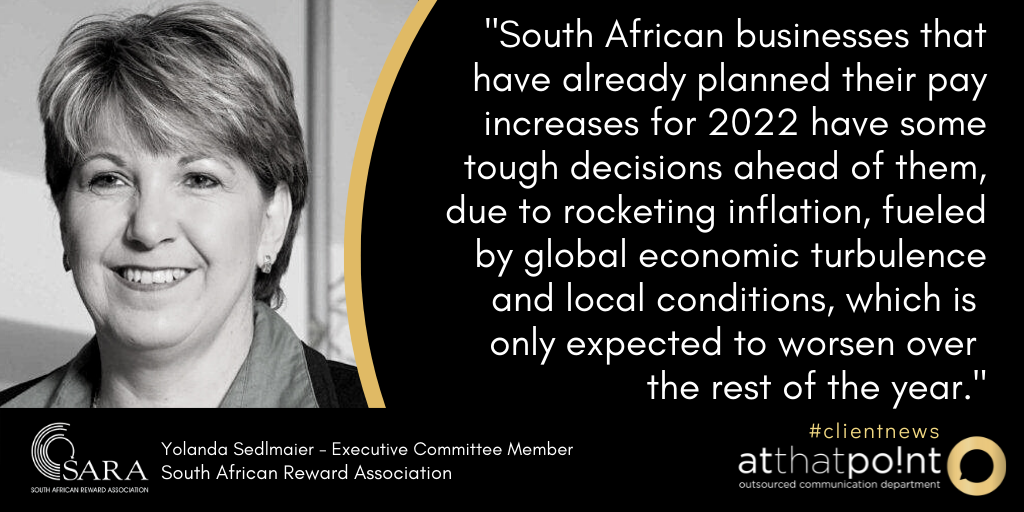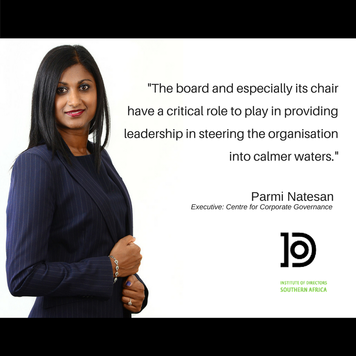 Conclusions and recommendations made in part one of the state capture inquiry report align closely to a letter sent by the Institute of Directors South Africa (IoDSA) to the Zondo Commission in September 2021. The letter included recommendations on director competencies as well as the nomination and selection of directors. Section 580 of the state capture inquiry report mentions that the appointment of board members to SOEs “has proven to be problematic and does not represent the “robust and transparent” process recommended by King IV”. It also highlights the common “disjuncture between the fiduciary duties of SOE board members and the profile, skills and expertise of incumbents”. Section 582 and 583 further explain why “the national interest demands that state owned enterprises operate under efficient and professional leadership which requires that the appointment procedure is transparent, not driven by party political interests but made in accordance with objective criteria”. King IV makes a few important recommendations relating to the governance of the nomination process. The first of these is Recommended Practice 15: “the processes for nomination, election and ultimately, the appointment of members to the governing body should be formal and transparent”. Recommended Practice 16 states that “before nominating a candidate for election, the governing body should consider the collective knowledge, skills and experience required by the governing body, the diversity of the governing body, and whether the candidate meets the appropriate fit and proper criteria”. “While we welcome the alignment between the conclusions of the report and what the IoDSA has been saying for years, we are anxious to see the implementation of the recommendation on the professionalisation of directors,” says Parmi Natesan, CEO of the IoDSA. Professionalising directorship will not automatically eliminate incompetent or corrupt directors any more than professionalising medicine or engineering achieved that goal. It will, however, provide an objective framework for ensuring that directors have the required skills in terms of an objective competency framework, and that they can be disciplined in terms of a professional Code of Conduct. Alongside the professional skills a modern director needs, it is vital that individuals who serve as directors possess the necessary personal qualities. Directors should above all be ethical, independent and courageous. Courage and independence are particularly necessary because directors must put the interests of the organisation first, and this may mean going against the interests of the parties which appointed them or, indeed, their own interests. “Our highly respected director development programmes, Certified Director (SA) and Chartered Director (SA) designations, and governance advisory services are available immediately to support the implementation of the recommendations made by the Commission,” says Natesan. ENDS MEDIA CONTACT: Idéle Prinsloo, 082 573 9219, [email protected], www.atthatpoint.co.za For more information on the IoDSA please visit: Website: https://www.iodsa.co.za/ Twitter: https://twitter.com/the_iodsa LinkedIn: https://www.linkedin.com/company/institute-of-directors-in-southern-africa Facebook: https://www.facebook.com/TheIoDSA
0 Comments
The Mail & Guardian reports that SAA chair, Dudu Myeni, has recently missed several special board meetings, and that her colleagues on the board are taking legal advice in this regard. If these reports are true, they may indicate that Ms Myeni is failing to fulfil some of her duties as a director, and more specifically a chair.
The reports also demonstrate the intimate connection between good governance and organisational performance and sustainability, adds Parmi Natesan, Executive, Centre for Corporate Governance, Institute of Directors in Southern Africa. “It is common knowledge that SAA is in dire financial straits, and has been for some time. At such a time, more than ever, the board and especially its chair have a critical role to play in providing leadership in steering the organisation into calmer waters,” Ms Natesan says. “Not attending several special board meetings at a time such as this is worrying, especially given that board meetings are typically scheduled around the chair’s availability in the first place.” The law requires directors to exercise care, skill and diligence in their role. It is generally agreed that in this context, board members should not only attend meetings, but also prepare rigorously for them in advance, so that they can make a valuable contribution. If they cannot attend, they should furnish valid reasons to the rest of the board, and also consider providing input before the meeting on the matters to be discussed. Because board chairs play such an important role, various governance guidance documents elaborate on this responsibility. Providing overall board leadership and presiding over board meetings to ensure that time in meetings is used productively are just two of the many vital functions that would be difficult to exercise when a chair is repeatedly absent. “It would also be interesting to know whether the SAA board has a deputy chair in place, or a lead independent director, to ensure that meetings can proceed effectively in the chair’s absence,” says Ms Natesan. “The troubles at SAA and other parastatals provide yet more support for what the IoDSA has always emphasised: the principles of good governance are integral to improved performance and sustainability. We hope the board will show the courageous leadership that is needed to pull the organisation back on track.” ENDS MEDIA CONTACT: Juanita Vorster, 079 523 8374, [email protected], www.atthatpoint.co.za For more information on the IoDSA please visit: Website: www.iodsa.co.za Twitter: @The_IoDSA LinkedIn: Institute of Directors in Southern African Company Page  Parmi Natesan offers advice on the type of directors that should serve on the SAA board Parmi Natesan offers advice on the type of directors that should serve on the SAA board The Minister of Finance, Pravin Gordhan, has recently renewed his calls for a new board to be appointed at South African Airways (SAA). His comments come as the national carrier’s financial statements are delayed, owing to the Treasury not providing the guarantees needed to convince its auditors that it is a going concern. Minister Gordhan is quoted as stating that the guarantees will only be considered once the airline has a new board and executive team. This‚ Gordhan told a business breakfast‚ would require a “whole new board” of “credible people… with the right balance of skill and exposure”. According to Parmi Natesan, Executive: Centre for Corporate Governance at the Institute of Directors in Southern Africa (IoDSA), “The IoDSA’s Board Appraisal Benchmark Study shows that public sector boards perform less well than those in the private sector. One of the reasons for this, sited by public sector board members themselves, is that board members are often political appointees, and thus lack the necessary knowledge, skills, experience and independence to fulfil their roles adequately.” The IoDSA’s Board Appraisal Benchmark Study concluded that board composition is probably the single most important governance factor in respect of an organisation’s future success. Interviews with members of these boards indicate that key challenges include the fact that incorrect criteria are used in appointing board members, lines of accountability are not clear, and a lack of industry knowledge resulting from the high turnover of ministers, MECs and directors. Need for professional directors “When it comes to appointing new members to the SAA board, it would be wise to ensure they have the correct knowledge and skills—public-sector directors have a tough job and the company’s performance is dependent on their competence,” Natesan says. “Directors generally have such an important role to play, and the issues they face are so complex, that a new cadre of professional directors is required.” In response to this need, the IoDSA has introduced a formal professional designation for directors, the Chartered Director(SA) or CD(SA). In addition, a structured pathway has been designed to enable directors/aspiring directors to acquire the director competencies they need to complement their existing business skills whilst working towards the designation. The CD(SA) designation also enables directors to demonstrate objectively their fitness to serve on a board, and provides a vehicle for continuing professional development. “While the pool of CD(SA)s is still relatively small, the pathway and ultimate designation should be used as a benchmark for competency to serve as a director in South Africa,” says Natesan. “If SAA is to turn the corner, it needs board members with the right knowledge, skills and personal competencies; and a clear understanding of their responsibilities to the organisation, to the state and, ultimately, to the citizens.” ENDS MEDIA CONTACT: Cathlen Fourie, 082 222 9198, [email protected], www.atthatpoint.co.za For more information on the IoDSA please visit: Website: www.iodsa.co.za Twitter: @The_IoDSA LinkedIn: The Institute of Directors in Southern Africa group |
Archives
July 2024
Categories
All
|


 RSS Feed
RSS Feed